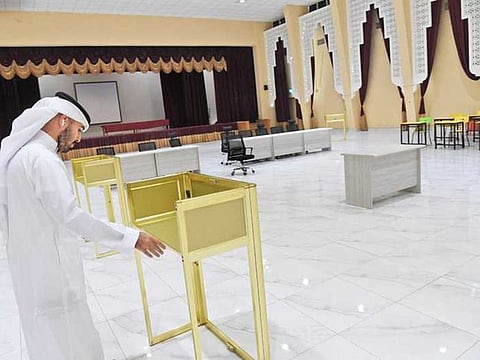Kuwait goes to polls, yet again, as some opposition groups return
Polls 6th in 10 years reflect repeated political crises that gripped state

Cairo: Kuwait will hold on Thursday its most inclusive elections in a decade with some opposition groups ending a boycott after the country’s royal rulers pledged not to interfere with parliament.
The polls are the sixth in 10 years, reflecting the repeated political crises that have gripped the only Gulf Arab state with a fully elected parliament.
The parliament was dissolved three months ago to end a protracted standoff between the government and parliamentary opposition that hampered crucial economic reforms in the country.
The polls will be Kuwait’s second legislative election since Emir Sheikh Nawaf Al Ahmad took office in September 2020 after his half-brother Sheikh Sabah’s death.
Several opposition MPs had been on strike in protest at delays to parliamentary sessions and the failure to form a new government. A core source of friction is MPs’ demand for ministers from the royal family to be held accountable for corruption.
Kuwait, which borders Iraq, Saudi Arabia and Iran and is one of the world’s biggest oil exporters, has held 18 elections since the parliamentary system was adopted in 1962.
313 candidates in fray for 50 seats
Parliament has been all-male since the only woman MP lost her seat in December 2020. Women represent 51.2 per cent of the 795,920 voters. About 70 per cent of the population of around 4.2 million is made up of expatriates. While the last elections were affected by anti-coronavirus measures, this time candidates have been able to open electoral offices and hold live hustings. Security services have stepped up their monitoring of vote-buying. The election results are expected to be announced on Friday. The opposition, mostly Islamist politicians, won 24 seats out of 50 in the last polls. Voters will cast their ballots at 759 polling stations set up in 118 schools across Kuwait. A total of 313 candidates are running in Thursday’s elections staged under judicial supervision and amid tight security. Around 12,000 military personnel and 3,000 civilian staffers will be deployed to secure polls and regulate voters’ access, Al Rai newspaper reported, citing security sources.
But when he dissolved parliament, Crown Prince Sheikh Meshal Al Ahmad Al Jaber Al Sabah promised there would be no interference by authorities in the election or the new parliament.
“We will not interfere in the people’s choices for their representatives, nor will we interfere with the choices of the next National Assembly in choosing its speaker or its committees,” the crown prince said.
“Parliament will be the master of its decisions, and we will not be supporting one faction at the expense of another. We will stand at the same distance from everyone.”
Opposition figures have stayed out of elections over the past 10 years, accusing executive authorities of meddling in the workings of parliament.
One of them, People’s Action Movement candidate Mohammad Musaed Al Dossari, said he had been persuaded to stand again by the crown prince’s promises.
Sheikh Meshal’s speech “reassured” Kuwaitis and “encouraged the political groups and MPs who had been boycotting to return to run in the elections”, Al Dossari said.
Thursday’s vote also comes after the country’s emir issued an amnesty last year for political opponents who had been tried on various charges.
State authorities have also announced measures to ensure smooth polling. “There will be a safety area in front of polling centres to maintain security by police,” said Director-General of Kuwait Municipality Ahmed Al Manfuhi.
He added that no campaigning or candidates’ posters will be allowed in the precincts of the polling stations to head off influencing voters.
Kuwait is divided into five electoral districts. Each is represented by 10 lawmakers at the 50-member legislature.
In the run-up to election, Kuwaiti authorities uncovered several attempts for vote buying. Several arrests were made.
Court gives go-ahead for election
Voters this time are allowed to cast their ballots using the national ID card.
Kuwait’s top court on Tuesday turned down a lawsuit seeking the election to be halted. The suit, filed by a lawyer, claimed that a decree allowing the use of the ID card in voting and another redefining electoral districts were unconstitutional.
Bogged down in rows
Kuwait’s legislative elections are characteristically hotly contested. The parliament, officially known as the National Assembly, has a four-year mandate.
In recent years, several parliaments proved short-lived in Kuwait due to raucuous and intractable disputes between lawmakers and the government, often bringing political life to a standstill.
Last June, Emir Nawaf exercised his constitutional right and dissolved the legislature after one such standoff paralysed decision-making and spawned public dissatisfaction in the country.
Two months earlier, the government resigned after more than half members of the parliament backed a no-cooperation motion against it, plunging Kuwait into a political stalemate.
On June 22, 2022, Kuwaiti Crown Prince Meshal Al Ahmad gave an address on behalf of the emir, announcing parliament’s dissolution and calling for a snap election.
“In response to the people’s wish and respect for their people to seek judgement of the constitution, we have decided to dissolve the National Assembly constitutionally and to call for general elections,” said the crown prince.
The royal urged voters to pick qualified candidates, warning that mischoice would harm the country’s interests and “bring us back to square one and atmosphere of prejudice and wrangling”.
The Kuwaiti parliament wields clout in the country’s decision-making. The legislature has the power to approve or block laws, quiz government officials and withdraw confidence from them.
-- With inputs from AFP


